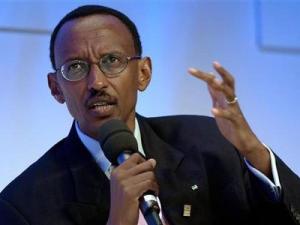ITU honours Rwandan President Paul Kagame
ITU honours Rwandan President Paul Kagame

Rwandan President Paul Kagame has been honoured by the International Telecommunications Union (ITU) for his leadership towards promoting ICT development and broadband connectivity.
According to an ITU press statement, Kagame is among winners of the 2014 World Telecommunication and Information Society Award, which is planned to be presented at a ceremony in Geneva on 16 May to mark the 149th anniversary of the establishment of ITU on 17 May, 1865.
Other recipients of the award include Park Geun-hye, the President of the Republic of Korea; and Carlos Slim, the chairman of Grupo Carso and president of the Carlos Slim Foundation.
President Kagame, in particular, has been recognised by the ITU “for his leadership in the advancement of education and the potential of ICT as a dynamic industry as well as an enabler for Africa’s socio-economic transformation by ITU.”
Kagame also serves as chairman of the UN Secretary General's Advisory Group on UN MDG Advocacy Group and he is co-chair of the ITU-UNESCO Broadband Commission for Digital Development.
“Broadband infrastructure development is a critical element in ensuring that ICTs are used innovatively as delivery vehicles for health, education, governance, trade and commerce in order to achieve sustainable socio-economic growth,” said ITU Secretary-General Hamadoun I. Touré.
“We need to implement national and domestic policies to accelerate the roll-out of broadband and to make it more affordable and accessible to all citizens; it is an effective way to empower people everywhere with information and knowledge to meet their aspirations and to achieve the overall goals of sustainable development,” said Touré.
Meanwhile, the ITU’s move to honour Kagame comes as Rwanda has been steadily climbing global ICT rankings.
The World Economic Forum (WEF) Networked Readiness Index (NRI) 2014, which ranks 148 countries based on their capacity to exploit opportunities offered by the digital age, points to how Rwanda has jumped from an overall position 88 on this list last year to 85 in 2014.
But while the WEF has praised Rwanda for its clear government position on promoting ICT use, it criticises the country for being slow to adapt with regard to other factors.
“Overall, the country depicts a profile similar to that of previous years. It makes little progress in improving its very expensive (128th) ICT infrastructure (108th), which results in a low uptake by its population (138th) despite the clear vision of the government (5th) to promote ICTs in the country,” notes the WEF about Rwanda.
“Weaknesses in its innovation system and the low share of its population that graduates from secondary education (139th) also affect its capacity to fully leverage ICTs to boost innovation (93rd) or increase its population’s online participation (112th),” notes the WEF.
But despite the WEF’s criticism of Rwanda, other research organisations are upbeat about the country.
Telecoms research firm BuddeComm notes in its profile of Rwanda that “the Rwandan telecom sector has shown particularly strong growth in recent years, buttressed by a vibrant economy and a GDP which has sustained growth of between 7% and 8% annually since 2008. As a result, the country is rapidly catching up with other markets in Africa, with increased penetration particularly evident in the internet and mobile sectors.”
“Rwanda’s internet and broadband sector has suffered from limited fixed-line infrastructure and high prices, but developments in the fixed network market are beginning to change this. The operators are rolling out national fibre-optic backbone networks which also allow them to connect to the international submarine fibre-optic cables that landed on the African east coast in 2009 and 2010,” notes BuddeComm.
“Interest from investors in the country’s ICT sector remains strong, particularly during the last few years. An existing deal with Korea Telecom to build a national fibre backbone was supplemented in September 2013 with a deal by which Korea Telecom will build a national LTE network, for which it has secured spectrum and an exclusive licence to operate the network for 25 years,” adds BuddeComm.
Of Rwanda’s 11.46 million population, 63% of the country has mobile connections, 0.4% fixed line access and internet penetration stands at 13.6%, according to BuddeComm.
